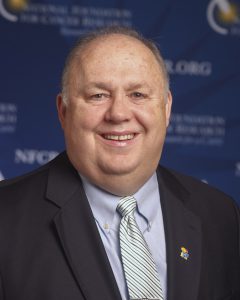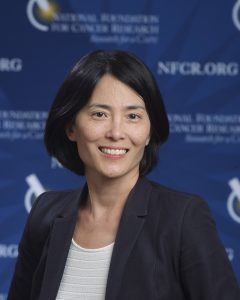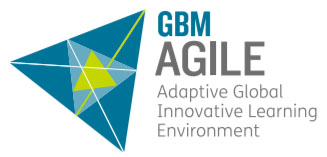Snapshot of Cancer Research Progress in 2018
Made Possible by National Foundation for Cancer Research and Supporters
The National Foundation for Cancer Research (NFCR) was founded in 1973 to provide scientists in the lab the funding they need to make game- changing discoveries in cancer treatments, detection, prevention and, ultimately, a cure for all types of cancer. NFCR has distinguished itself in the cancer research sector by emphasizing long-term, transformative research often overlooked by other major funding sources. With the help of more than 5.3 million individual donors over the last 45 years, NFCR has provided more than $380 million for cancer research in the laboratories, cancer prevention and education. NFCR discoveries have directly or indirectly led to many important medical advances that are saving lives today.
A FEW OF THE KEY PROGRESSES
ACHIEVED BY NFCR SCIENTISTS IN 2018:
20
Cancer biomarkers
Identification or evaluation of genetic pieces of cancer’s vulnerabilities that may lead doctors to earlier diagnoses and precision treatments.
19
New drug candidates and potential therapeutics
Identification of anticancer agents that could lead to new treatment options desperately needed by patients
8
Cancer-Related genes and proteins
Discovery and further exploration of key cancer molecules which could provide new targets for drug development
Notable Research Highlights
For the laboratory-based, discovery-oriented research that we have so proudly been funding for four decades, NFCR scientists continue to make remarkable advances in the fight against cancer. Here is a snapshot of research progress in 2018 made possible by generous donations from loyal supporters like you.
Identifying Patients Likely to Respond to Immunotherapy
Daniel Haber, M.D., Ph.D.
Massachusetts General Hospital
Cancer, Center, Boston, MA

Immunotherapy for metastatic melanoma remarkably increases survival for some patients beyond ten years. For others, the response is minimal and ineffective treatment may continue before standard tests confirm the lack of response. Monitoring an early response to immunotherapy is a challenge. Assessing local immune response from invasive serial tumor biopsies from single metastatic sites may not represent other metastatic sites – the tumor burden – in melanoma, a cancer caused by various genes. To address this challenge, Dr. Daniel Haber’s team will use their previously developed liquid biopsy blood test that captures circulating tumor cells (CTCs) shed from all tumor sites and present in patient’s blood samples. They have discovered a signature panel of 19 RNA molecules expressed in captured melanoma CTCs that can be ‘scored’ to measure tumor burden in response to therapy. CTC RNA scoring blood test at 7 weeks of therapy correlated with marked improvement in survival without tumor growth. Early assessment of treatment response can guide application of immunotherapy. Moreover, CTC RNA signatures may also be identified in other cancers.
New Approaches to Treating Pancreatic Cancer
Daniel Von Hoff, M.D. Translational
Genomics Research Institute (TGen),
Phoenix, AZ

Pancreatic cancer, the 3rd leading cause of cancer death in the U.S., has a 5-year survival rate of less than 9%. One reason current treatments have limited activity is tumors are surrounded by stroma – dense fibrotic tissue of immune cells, fat cells, stem cells, fibroblasts and other cells. Stroma interacts with cancer cells, contributing to its aggressiveness and drug resistance. Also, pancreatic cancer cells themselves undergo the EMT (Epithelial-Mesenchymal Transition) process that allows the cells to metastasize and resist treatment. NFCR scientists are developing new treatments for pancreatic cancer by targeting the stroma and the EMT process. With biopsy samples from human tumors and lab models, single cell RNA sequencing identifies all RNA expressed in individual cells, revealing the distinct cell types and signaling pathways that characterize each cell population. From these results, therapies better tailored to a patient’s tumor are being selected to treat pancreatic cancer patients in a pilot clinical trial. EMT inhibitors are first tested in an EMT assay using zebrafish as a model, before testing in pancreatic cancer models. In this era of precision oncology, the best drugs matched to the individual’s targets may further improve care of pancreatic cancer patients who have no other options.
Making Inroads to Defeat Metastasis
Danny R. Welch, Ph.D.
University of Kansas Cancer Center,
Kansas City, KS

At least 90% of cancer deaths are due to a tumor’s spread or metastasis to vital organs in our body. Dr. Danny Welch, with NFCR funds, has previously discovered eight of the 35 known metastasis suppressor genes. In metastasis, many of these genes are under-expressed and produce minimal or non-existent levels of their proteins, allowing cancer to spread. In KISS1 and BRMSI genes, his team has identified domains (small regions) in each protein that are crucial in suppressing metastasis and interacting with potential protein partners. The idea is to develop small molecules that mimic the activity of the domains and can function as a complete protein to suppress metastasis. In other research, Dr. Welch has developed a complex metastasis cancer model wherein small genetic changes (single nucleotide polymorphisms) may better explain racial disparities in tumor development, as well as better predict metastasis and patient survival. A genetic test on a patient’s blood sample may help doctors plan treatments more carefully.
Combination Therapy for Resistant Lung Cancer
Alice T. Shaw, M.D., Ph.D.
Massachusetts General Hospital Cancer
Center, Boston, MA

The cornerstone of treatment for patients with ALK-positive non-small cell lung cancer (NSCLC) is ‘ontarget’ therapies targeting the cancer-promoting ALK proteins. These therapies have dramatically improved the outlook for patients, but, eventually, almost all patients will develop resistance. Their tumors will have developed ‘off-target’ mechanisms of resistance that activate downstream growth signaling pathways bypassing ALK. To develop a treatment for ‘off-target’ resistance, a panel of resistant cell lines derived from patients was screened with an RNA library matching 1000 genes of cell-growth pathways. One potential ALK-independent growth pathway identified is Shp2 protein. A Shp2 inhibitor combined with on-target ALK inhibitor in patient-derived cell lines inhibited cancer cell growth. After efficacy of the two drugs is established in pre-clinical models, a first-in-man phase 1 clinical trial treating ALK-positive NSCLC patients will determine if the combination therapy can overcome resistance. Combination therapy could become a frontline therapy, and improve the chance of a durable and complete remission – bringing patients one step closer to a cure.

The diagnosis of glioblastoma (GBM) strikes fear into the hearts of patients, brings despair to families and generates deep frustration among those in the medical and clinical research community. GBM is the most common brain cancer and is uniformly lethal. Today, a typical GBM patient who receives standard-of-care-treatment survives only 14.6 months.
While there have been significant laboratory and clinical investigations into GBM over the years, the “standard-of-care treatment” – surgery, chemotherapy and radiation – has remained unchanged.
This troubling state of affairs for glioblastoma patients was the impetus for creating the GBM AGILE (GBM Adaptive Global Innovative Learning Environment) trial for patients with newly diagnosed and recurrent glioblastoma. NFCR has been supporting GBM AGILE since day one, from ideas to operation, in partnership with the Global Coalition for Adaptive Research (GCAR) and other charities.
- GBM AGILE is a revolutionary new type of “adaptive” trial platform, one that will evaluate and test multiple drugs simultaneously, with the goal of identifying new and effective therapies to treat and cure this deadly brain cancer.
- The trial will allow patients to enroll more quickly, receive treatment(s) based on each patient’s individualized response and does not require years of follow-up to determine whether a new experimental treatment is beneficial.
By design, GBM AGILE is changing the IDEA of clinical trials.
Innovative – The new “adaptive trial” will lower cost of development and speed progress.
Dynamic – Perpetual learning system to quickly add potentially promising new drugs and drop those that appear to be ineffective.
Efficient – Design and trial structure that will require fewer patients and a shorter time frame to get important answers about a drug’s effectiveness.
Accessible – Global effort open to a broad patient population of newly diagnosed and recurrent GBM patients.
NFCR supports GBM AGILE, recognizing it as being among the most innovative and paradigm-shifting trial platforms in the world, and one that may provide huge impacts for brain cancer patients.
Significantly, the knowledge and the trial design platform established from GBM AGILE can be a model to be used for other rare and deadly cancers – giving cancer patients hope for treatments that are best suited for their care.
IRA

Recent federal tax changes have potentially changed the landscape for the charitable gift tax deduction. By increasing the standard deduction, many tax payers will not be able to take advantage of the charitable gift tax deduction. However, an IRA Charitable Gift can still help NFCR as well as benefit you from a tax perspective.
How does it work? If you are 70 ½ or older you can gift up to $100,000 directly from your IRA to NFCR and you do not have to pay income taxes on this gift. This gift can also count towards your Required Minimum Distribution (RMD), which you have to take anyway.
Simply contact your IRA custodian and ask them to direct your distribution to NFCR. Please contact us at 1-800-321-2873 or go to our website at NFCR.org to obtain instructions on how to make an IRA charitable gift.
The Power of Your Donation
Please help NFCR continue to provide essential funding for the kind of research that will lead to a cure of cancer.
One discovery at a time, we are getting closer to our shared foal – finding cures for all types of cancer.
Your continued support in our fight against cancer is heartening. Without you, cancer research would not be where it is now. Whether these promising research programs can continue to move forward in the New Year is also dependent on us all. Below are some example of how your donation can make a difference.
$100
Performs one biopsy to get tumor tissues from a patient for a variety of pathological tests and biological analyses
$250
Buys one case of petri dishes for growing cancer cells – an essential first step to identify tumor markers or test treatment effectiveness of new drugs
$500-750
Buys one antibody test to determine whether tumor cells have a specific marker for drug resistance
$1,000 – $2,500
Carries out a comprehensive genome-wide analysis on all genes in one tumor sample, for developing targeted and personalized cancer therapies
$2,500
Conducts assays for evaluating anti-cancer effects of hybrid drugs in 8 cell lines of Triple Negative Breast Cancer
$5,000
Buys immunoassay reagents for testing 6 autoantibodies in 2,000 tumor samples to establish effective biomarkers for early detection of ovarian cancer
$10,000
Purchases a chemical library containing 5,000 compounds to identify new compounds that inhibit metastasis of prostate cancer in bone
$25,000
Purchases a scanner to produce gene chip data that identifies new biomarkers for early detection and more effective treatment
$100,000
Supports a Research Fellow to conduct critical laboratory cancer research for a year
$250,000 – $1 million
Supports an entire translational cancer research project for a year
How You Can Give
Gifts to NFCR can be made in a variety of forms to best align with your needs and charitable intent. Gifts can be made in honor or memory of a friend, colleague and/or a loved one. Popular ways to give at the end of the year include:
“Cash” Gifts can be made by check, credit card, online at nfcr.org, or via a donor advised fund.
Gifts of Stock (long-term securities, including stocks and bonds) can be a source of significant tax benefit by eliminating capital gains taxes as well as receiving an applicable tax deduction.
Charitable IRA Gift are gifts made directly from a traditional IRA to NFCR. Donors must be at least 70½ years old. While not income tax deductible, these types of gifts may help a donor with meeting his/her annual IRA required minimum distribution and provide other tax benefits.
Gifts that Provide Income for Life: NFCR offers charitable gift annuities that provide guaranteed income to a donor for life (and/or life of a spouse) with a portion eligible for a tax deduction.










